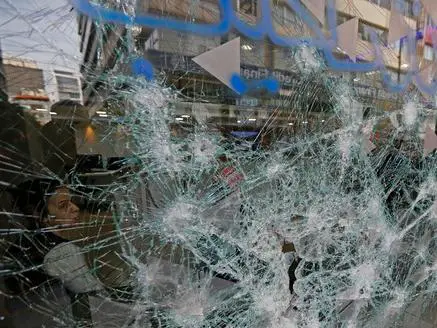Beirut's First Investigative Judge Ghassan Oueidat suspended late Thursday a decision by Lebanon's Financial Prosecutor Ali Ibrahim to freeze the assets and properties of 21 Lebanese banks.
Oueidat said he wants to study first the decision's effect on the local currency, banks transactions, depositors' money and the economic security.
Ibrahim ordered earlier on Thursday the freezing of the assets of 21 banks while prohibiting the chairmen of the banks, board of directors and general managers from touching these assets because investigations showed that the banks did not treat customers properly by not allowing them to withdraw their savings.
Lebanese citizens are currently not free to withdraw their deposits because of unofficial restrictions imposed by banks following a shortage in the U.S. currency.
People stand in lines ever day in banks to withdraw as little as 100 U.S. dollars weekly. Some allege that the banks have used their deposits to finance the government's budget deficit over the past years.
Dan Azzi, advanced leadership fellow at Harvard University, believes that the decision was positive which had to happen sooner or later.
"Depositors have the right to know how their deposits were spent," Azzi said, adding that banks have always assured depositors about the safety of their accounts but now they are failing to allow people to use their money freely.
Azzi also noted that it is time to fight corruptive actions which were not taken seriously in the past.
Ziad Baroud, civil society activist and former minister of interior and municipalities, said that protesters, who have been in the streets since Oct. 17 last year, will react positively to this move.
"We should build on this decision by doing in-depth investigations to inform people about the destiny of their money," he said.
Baroud urged Oueidat to continue working on this file to investigate big money transfers that took place in the past months and led to the current liquidity crisis.
Several reports circulated in the past months accused banks owners of facilitating the transfers of big depositors' money to foreign countries while restricting withdrawals by small depositors.
While some experts emphasized the need to fight against corruption, they considered Ibrahim's decision as inappropriate as the country is preparing to make a huge decision about the repayment of Eurobonds maturing on March 9.
Paul Morcos, founder of JUSTICIA Beirut Consult Law Offices, said that he is in favor of the fight against corruption and the investigations that would hold everyone accountable for their malpractices over the past years.
However, he said that Ibrahim's decision was surprising and it will have an impact on confidence in Lebanese banks.
"There is a reputational risk at stake here," Morcos said.
Nassib Ghobril, economist and head of the economic research department at Byblos Bank, believes that this decision will have a tremendous effect on banks' reputation worldwide.
Ghobril added that politicians aim to divert people's attention from their wrongdoings over the past years by holding banks accountable for the current situation.
The decision is unfair because the central bank forced the banks to lend to the government while the central bank was, in its turn, forced by politicians to lend to the government, said Elie Yachoui, independent economist and former dean of the School of Business Administration and Economics at Lebanon's Notre Dame University.
"Lebanese officials and the central bank should equally assume responsibility of the current financial crisis," he added.
(by Xinhua Writer Dana Halawi)
 简体中文
简体中文





